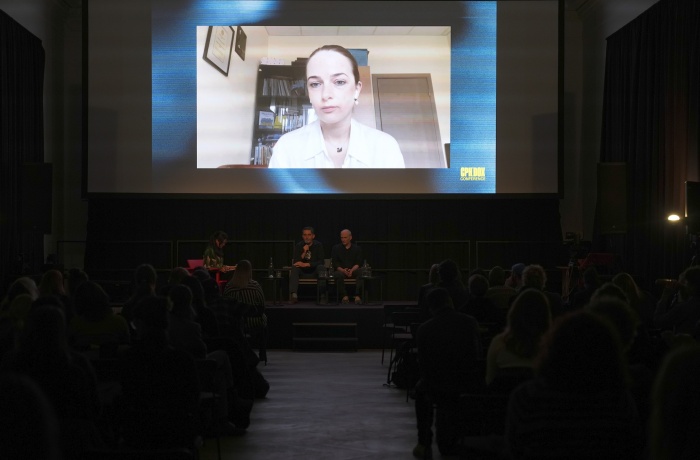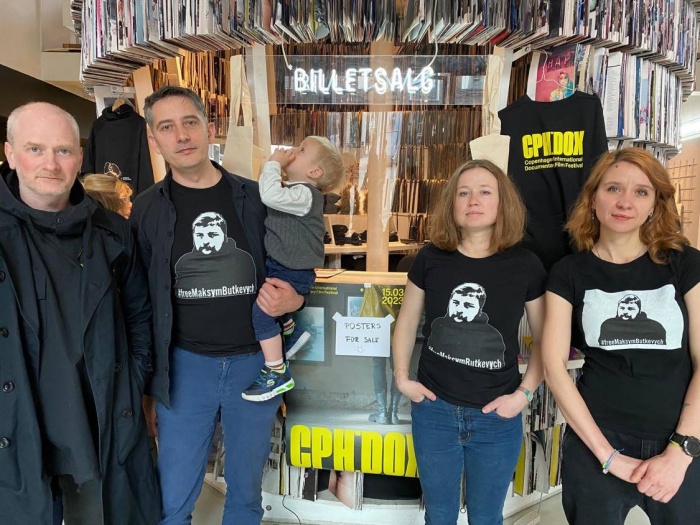
CPH:DOX, one of the largest documentary film festivals in the world, was recently held in Copenhagen. The Ukraine War Archive team presented the initiative live and spoke about documenting war crimes.
A special event guest was Oleksandra Matviichuk, a project partner, co-initiator of the Tribunal for Putin project, and head of the Center for Civil Liberties, which became the Nobel Peace Prize laureate in 2022. We asked Roman Bondarchuk, the head of the Ukraine War Archive, about the event.
Impressions of the festival
This was my first experience at CPH:DOX. Until now, the festival dates overlapped with Docudays UA, and the preparations for the festival in Kyiv did not allow me to attend it. Knowing that last year's hit was a film about Navalny and that the programme dedicated to Ukraine was titled "Ukraine Is an Independent State," I can say that the festival made a significant leap in understanding us and our problems. Ukraine was represented by Ukrainians who told us first-hand what is happening to us at the everyday and emotional level and what is needed to ensure that this war ends in our victory. In particular, projects by Iryna Tsilyk, Oksana Karpovych, and Yegor Troyanovsky participated in the industry section. Two of these projects received jury awards. The programme also included 20 Days in Mariupol by Mstyslav Chernov, When Spring Came to Bucha by Markus Lenz and Mila Teshaieva, and The Hamlet Syndrome by Elvira Nevera. These works offer a close glance at the traumas caused by Russia's invasion.
Alisa Kovalenko, director of the film We Will Not Fade Away, spoke at the conference during the festival and clearly explained to the audience why we need weaponry supplies and how they can shift the course of this war. In general, I am pleased that Ukraine is widely presented, that people want to hear and understand us better than a year ago.
About the project presentation, audience reaction and cooperation offers
Despite the paid entrance to the conference, the hall was full. People, who cared, came together. They were interested in the details of our work and opportunities to get involved. Immediately after the presentation, we received offers from the audience who wanted to join the project as volunteers. Representatives of the IT sector offered to help with their own resources. Oleksandra Matviichuk joined the presentation from Kyiv online and told the story of a photo from the Balkan War. It shows a Serbian soldier kicking an elderly woman in civilian clothes lying in a pool of blood. It took journalists 31 years to find out the circumstances under which the photo was taken. It turned out that the soldier was never punished. After the war ended, he became a DJ, playing at nightclubs and music festivals.
Now, thanks to new technologies for searching and verifying information, his identity has been established. We are developing these technologies at the Ukraine War Archive so that everyone who has suffered can count on justice. In addition to the presentation, we held many informal meetings, and I hope that new partners will soon join our project.
Why is it important to present the Ukraine War Archive at international venues?
Russia is investing huge resources in "everything is not so clear-cut," in making as many people as possible passive, to be "against the war," forgetting who the aggressor is and that the most active phase of the confrontation is now underway. They want to make the war look so cruel and frightening that it is unbearable to watch. Thus making supporting Ukraine more challenging. In this regard, the calls for negotiations are frequent. Many people are dying "on both sides" daily, and this must be stopped as soon as possible. Someone must always remind that, for us, a stop means extinction. We will simply be conquered and destroyed as a people. What is happening is genocide, and the enemy openly declares this goal. Hybrid information attacks are taking place in all the world's capitals and include anti-war marches calling for peace but through the cessation of arms supplies to Ukraine. Only the stories of specific people who have suffered from war crimes, that is, the presence of Ukrainian citizens in person at all important international platforms, allow the rest of the world to identify with us. To remind themselves of what human dignity is. To put themselves in our shoes. Find the courage to help us.
Text prepared by Maria Hlazunova
Photo: CPH:DOX IDFF
The opinions, conclusions or recommendations belong to the authors and editors and do not necessarily reflect the views of the governments or charities of these countries. The responsibility for the contents of the publication is borne solely by the authors and editors.